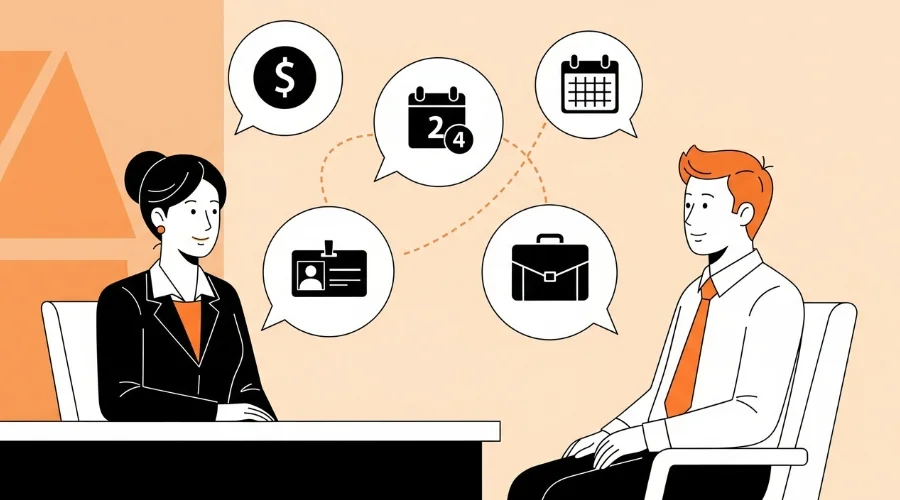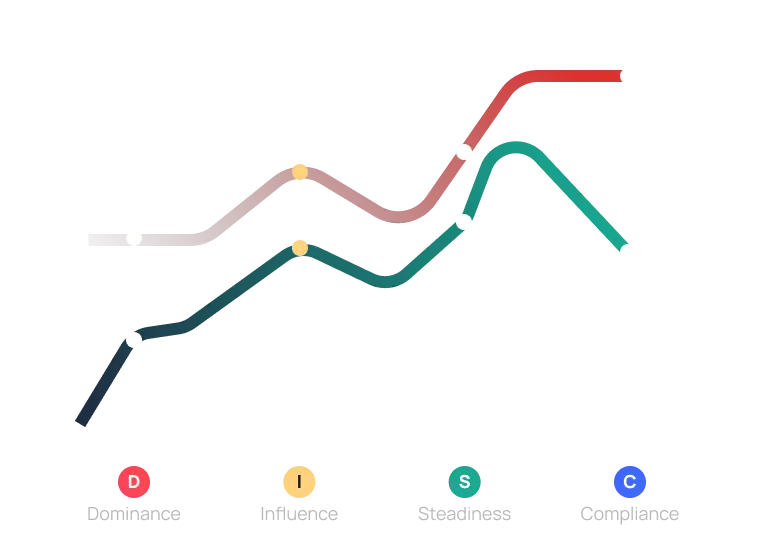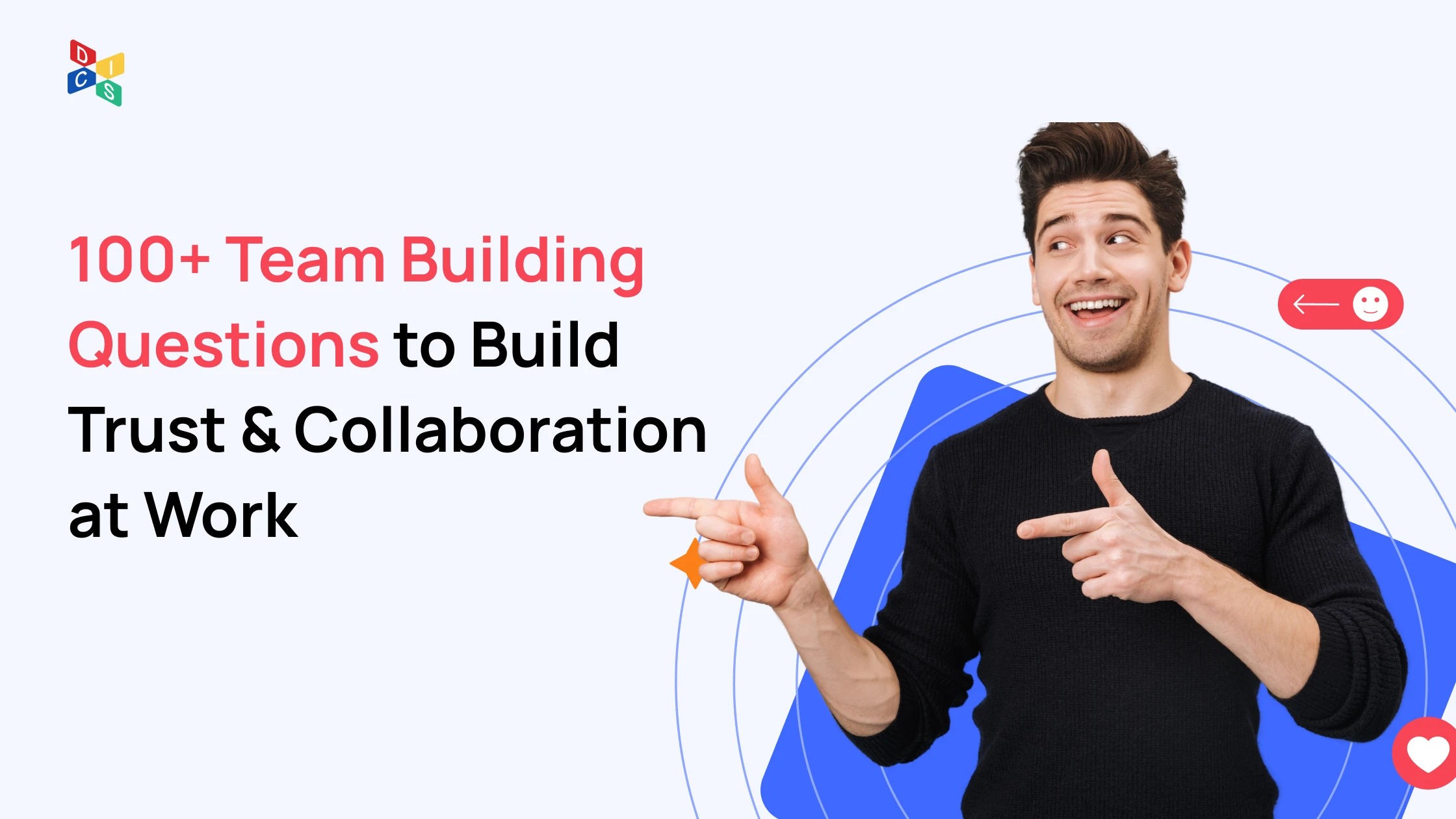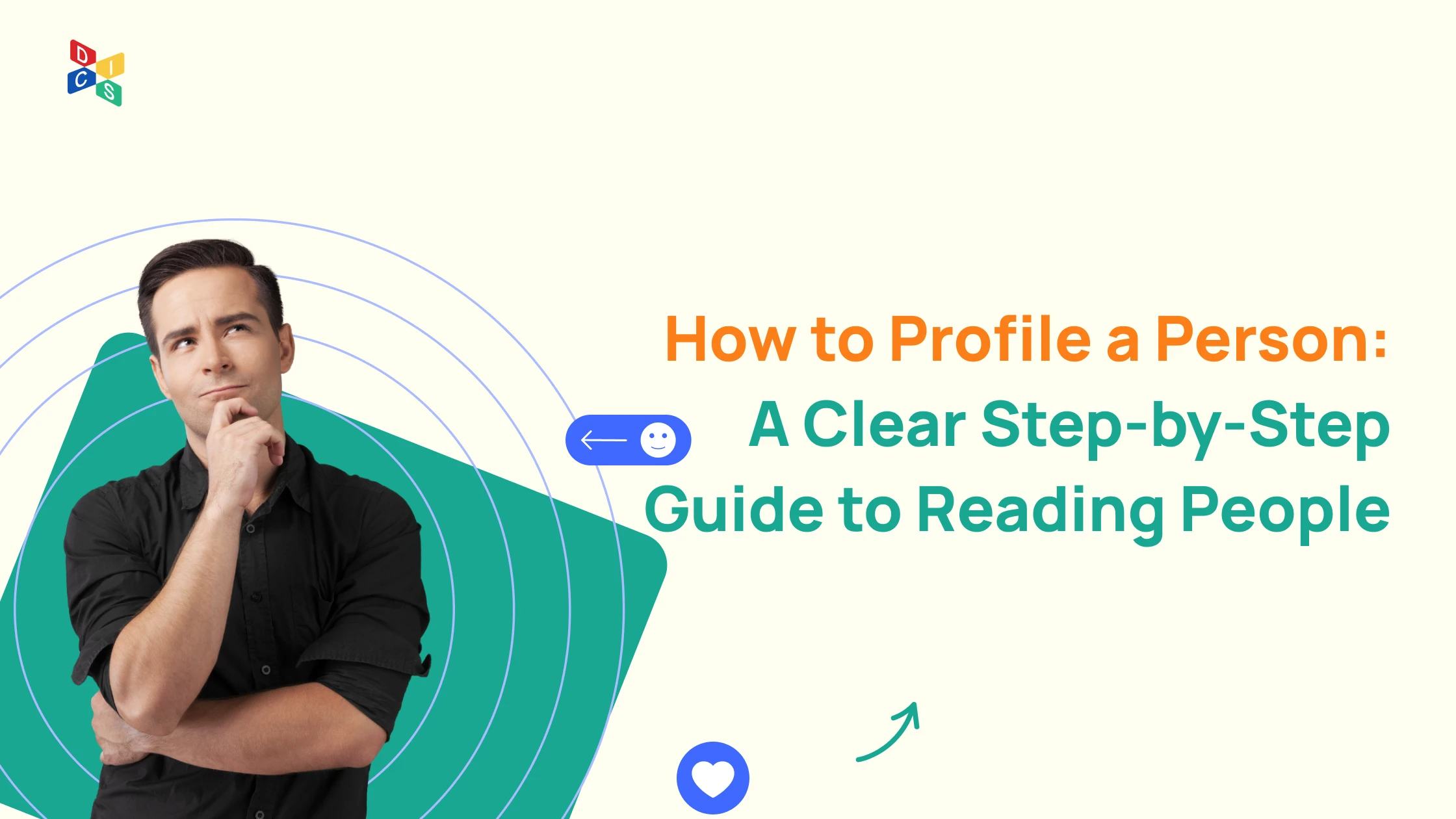Table of content
Employment Screening Questions: 35 Examples to Identify the Best Candidates
Discover 35 powerful employment screening questions to assess skills, motivation, and cultural fit - plus expert tips for effective candidate selection.
Table of content
Choosing the right talent begins long before the interview. Smart, well-planned employment screening questions help recruiters uncover a candidate’s true skills, attitude, and potential fit within the company culture. These short, focused questions reveal how candidates think and work. In this guide, you’ll explore 35 examples designed to make your hiring faster, fairer, and far more effective.
What Are Employment Screening Questions?
Employment screening questions are short, targeted questions used to learn about a candidate before a full interview. They help recruiters understand a person’s work background, skills, and behavior. These questions also show how well a candidate fits the role and the company’s values.
Recruiters often use them during the pre-employment screening stage, which may include online forms, phone calls, or short video chats. The goal is to filter out unqualified applicants and move the best ones forward faster.
Using clear employment questions saves time and improves hiring quality. It helps recruiters see the most suitable candidates right away. This step makes the hiring process fair, efficient, and more focused on real potential.

Why Employers Use Screening Questions
Employers use employment screening questions to find the right people before moving to full interviews. These questions make the hiring process faster, fairer, and more accurate.
- To spot qualified candidates: Screening questions help remove applicants who do not meet the job’s main requirements. This lets recruiters focus only on people who match the role. With clear employment questions, it’s easier to see who has the right skills and background.
- To check attitude and fit: Skills matter, but attitude matters too. Employers want to know if someone will fit well with the team and company culture. By asking employment screening questions, recruiters can learn about a person’s mindset, motivation, and communication style.
- To save time and reduce costs: Interviewing every applicant takes too much time. Screening questions help narrow down the list early. Well-planned these questions allow employers to focus on the most promising candidates.
- To keep hiring fair and consistent: When every applicant answers the same employment questions, the process becomes fairer. It helps reduce bias and ensures that each person is judged equally.
In short, employment screening questions make hiring easier and more effective. They help companies choose people who not only qualify for the job but also fit the team’s values.
Types of Employment Screening Questions
When hiring, it’s important to ask the right employment screening questions. These help recruiters learn about each candidate’s background, skills, and attitude before moving forward in the process.

Below are the main types of questions you can use:
1. Basic Background Questions
These are simple questions asked at the start of an interview. They help the candidate feel comfortable and give the recruiter basic information. You can ask about career goals, salary range, or reasons for applying. These questions help you understand if the candidate’s expectations match the role.
2. Behavioral Questions
Behavioral questions focus on how a candidate has acted in real situations. They help recruiters understand work habits and problem-solving skills. Start questions with phrases like “Tell me about a time when…” or “Give an example of how you handled…”. Including these in your employment screening questions helps you learn how the person performs at work.
3. Situational Questions
These ask the candidate how they would handle a specific work challenge. The goal is to see how they think and respond under pressure. For example, you might ask about conflict resolution, teamwork, or time management. Situational questions add depth to your employment questions by revealing employment personality and decision-making ability.
4. Technical Or Skill-Based Questions
These focus on the practical side of the job. They test whether the candidate has the right skills and knowledge. You can ask about tools, software, or methods used in their field. Adding these to your employment screening questions ensures you find candidates who can do the job well.
By using all four types of employment questions, you can build a clear picture of each candidate. This approach helps you find people who are both capable and a good fit for your team.
Top 35 Employment Screening Questions (With Sample Answers)
Below are 35 powerful employment screening questions that help recruiters assess candidates more effectively. Each group focuses on a different hiring goal - from understanding background and teamwork skills to evaluating motivation and job readiness. Use these examples to create a fair, structured, and insightful screening process for your next hire.
General and Background Screening Questions
Below are common employment screening questions used by recruiters to learn more about each candidate’s goals, background, and motivation. These help identify who fits best with the job and company culture.
1. What are you passionate about?
“I’m passionate about helping clients reach progress and find solutions. I focus on improving my professional skills every day to deliver the best service possible.”
2. What do you know about our company?
“I’ve followed your company for a long time. I know you value change, protect the environment, and care deeply about your employees.”
3. How does your previous work experience relate to this role?
“I’ve spent the last five years gaining skills in marketing, sales, and customer communication. These experiences help me understand how to succeed in this new position.”
4. Describe what you do in your current role.
“My day involves managing supplier contacts, reviewing product samples, creating purchase orders, and supporting junior team members.”
5. What are your career aspirations?
“My goal is to move into senior management so I can mentor others and contribute to company growth.”
6. How will this position help move you closer to your goals?
“This job will help me develop my leadership and coaching skills, preparing me for future management roles.”
7. Why did you leave or are you leaving your last job?
“I enjoyed my previous role, but I’m ready for the next step. I want to work in a tech-driven company where I can make a bigger impact.”
8. Explain the employment gap in your résumé.
“I took time off to move abroad and settle into a new environment. It helped me understand the job market and prepare for my next career step.”

Teamwork and Work Style Questions
This section includes employment screening questions that help employers understand how a candidate collaborates with others, handles challenges, and integrates into a team. The answers offer insight into communication style, collaboration skills, and adaptability in the workplace.
9. How do you like to be managed?
“I work best under managers who are clear, direct, and supportive. I also value leaders who show appreciation and give constructive feedback.”
10. What type of work environment helps you to thrive?
“I perform best in a collaborative and positive workplace. I enjoy open communication and teamwork where creativity and new ideas are encouraged.”
11. Describe your ideal workday.
“My ideal workday allows focus and independence while still being part of a team. I like completing tasks without constant interruptions but value meaningful collaboration.”
12. Do you prefer working with a team or on your own?
“I enjoy both. I appreciate teamwork for shared ideas but also like working alone when tasks need focus and attention to detail.”
13. What role do you usually take on within a team?
“I often take a leadership or coordination role. I like motivating others, solving problems, and helping the team stay organized.”
14. What do you think makes a team successful?
“Clear communication, mutual respect, and shared goals make a team strong. Everyone should feel valued and understand their responsibilities.”
15. Describe a problem or challenge you’ve experienced in a team and how you resolved it.
“In one project, a teammate was less engaged, which slowed our progress. I spoke with them privately, listened to their concerns, and we worked together to restore balance and motivation.”
Problem-Solving and Time Management Questions
These employment screening questions help employers understand how candidates approach and manage problems, handle stress, and prioritize multiple tasks. They reveal a person’s ability to stay focused, stay calm, and adapt when plans change, also known as personality interview questions.
16. What was your biggest challenge in your last role, and how did you resolve it?
“My toughest challenge was losing a key teammate and taking over their work while we searched for a replacement. I spoke honestly with my manager, and together we restructured the workload. It helped balance my tasks and improve team efficiency.”
17. Have you ever had multiple simultaneous deadlines? How did you manage your time effectively?
“Yes, I’ve often managed several projects at once. I plan by setting clear priorities, using time blocks, and avoiding distractions. This helps me finish each task on schedule without feeling overwhelmed.”
18. How do you prioritize tasks?
“I organize tasks by urgency and importance. I complete high-impact tasks first, then move to less critical ones. This method keeps me focused and ensures nothing important gets missed.”
19. What tools do you use to manage projects and make sure you complete them on time?
“I rely on tools like Asana, Google Calendar, and Trello to track progress and deadlines. These tools make it easy to stay organized and communicate with my team effectively.”
20. Describe a time when you had to adapt to a sudden change
“When our company switched to a new software system, I quickly learned the new process and helped train my coworkers. Adapting fast helped our team stay productive and reduce downtime.”

Skills, Experience, and Job Responsibilities
This section of employment screening questions focuses on a candidate’s key skills, experience, and ability to handle work responsibilities. These help employers assess how well an applicant can contribute to the role and adapt to new challenges.
21. What are/were your responsibilities in your current/last job?
“In my current role, I create marketing content for clients, manage social media posts, review junior team members’ work, and build strong client relationships.”
22. What’s your greatest strength?
“My greatest strength is resilience. It helps me stay calm under pressure, overcome challenges, and motivate the people I work with.”
23. Did/Do you have responsibilities in your previous/current role that were/are not part of your job scope? If so, what were/are they?
“Yes, I took on extra duties such as communicating with the press and representing the product team. These responsibilities helped me grow into a leadership mindset and gain confidence.”
24. Do you have any experience with remote or hybrid working?
“Yes, my company follows a hybrid model. I usually work in the office three days a week and from home the other two. This setup gives me a balance between teamwork and personal focus.”
25. What experiences, responsibilities, or challenges are you hoping for in this new role and company?
“I’m looking forward to managing junior team members, working with larger clients, and being part of an organization that offers professional growth and learning opportunities.”
Motivation and Company Fit Questions
When recruiters ask employment screening questions about motivation and company fit, they aim to see what inspires each candidate and how well they align with the organization’s mission. These questions reveal if the applicant’s personal goals match the company’s culture, helping employers find people who will stay engaged and committed in the long run.
26. Why do you want this job?
“I want this job because it combines HR, business, and marketing - areas I’m skilled in and passionate about. It’s a role where I can apply my experience while continuing to grow.”
27. Why do you want to work at this company?
“I truly admire your company’s mission to promote equality and empower people. Joining your team would allow me to contribute to meaningful work that makes a difference.”
28. Where do you see yourself in five years?
“In five years, I hope to be in a senior management role, leading a strong team and driving company success through clear goals and collaboration.”
29. What about this position made you want to apply?
“I’ve been a loyal customer for many years, so when I saw this position, I felt it was the perfect fit. It’s a chance to work for a brand I already trust and believe in.”
30. How familiar are you with our company and what we do?
“I know your company is a leader in health and wellness. You provide online yoga classes, meditation programs, and lifestyle products designed to help people live better.”
31. What makes you want to work for us instead of our competitors?
“Your company stands out because of its positive impact on people’s lives. I want to be part of an organization that creates real change, not just sells products.”

Practical and Logistical Screening Questions
These employment screening questions help employers confirm essential details before making a hiring decision. They focus on practical matters such as pay expectations, start dates, and work flexibility. Clear answers build trust and show professionalism.
32. What are your salary requirements?
“I’m looking for a salary of around $80,000 per year. I believe this range matches my experience and the responsibilities of this role.”
33. What benefits are important to you?
“I value health insurance, paid vacation, and family-related benefits. These help me stay productive and balanced at work.”
34. Why should we hire you?
“I bring the right mix of skills and experience to this position. I’m passionate about your company’s mission and confident I can deliver strong results.”
35. When can you start?
“My current job requires a four-week notice. I’ll be ready to start right after completing that period.”
36. Are you willing to travel or relocate for work?
“Yes, I’m open to traveling for projects. Relocation is also possible with advance notice, as I want to plan properly for my family.”
37. Talk me through your résumé
“Since graduation, I’ve worked in administrative roles, managing schedules and team support tasks. I’m now seeking a senior position with more responsibility and room to grow.”
38. Do you have any questions for me?
“Yes. Could you share what you enjoy most about working here? Also, what would be the main project I’d start with if hired?”
How to Structure and Ask Smart Screening Questions
When you plan to use employment screening questions, the way you structure and present them varies depending on the circumstance. This involves deciding which questions to ask first, how to sequence the list you have prepared, and how to frame each question. For example, submitting a pre-hire questionnaire online differs notably from conducting a live interview.
An online form
When using employment screening questions in an online form, keep it short and clear. Each job role should have its own version of the form. Use simple and relevant questions that match the position and the skills required. Fewer questions lead to a higher completion rate. If the form is too long, many candidates will not finish it. Focus only on what helps your candidate evaluation process.
Via phone or video call
If you ask employment screening questions by phone or video call, start with light and friendly questions. This helps the candidate relax before you move to deeper or technical ones. Ask a mix of behavioral and situational questions to understand how they handle tasks or challenges.
Take short notes on their tone, confidence, and attitude. These insights are useful for the next hiring stage. Keep the call between 15 and 30 minutes to decide who should move forward.
In-person
When interviewing in person, you usually meet only the top applicants. At this point, you already know they meet the main job requirements. Use this step to explore their work style and how they act under pressure.
Ask employment screening questions that reveal problem-solving ability and teamwork skills. This face-to-face talk helps you confirm if the person truly fits your team and company culture.

Best Practices for Screening Candidates Efficiently
Hiring the right person starts with clear and focused employment screening questions. A simple, structured interview process helps you find people who fit the job and your company culture. Follow these steps to make your screening faster and more effective:
- Set clear screening goals: Decide what you want to learn from each interview. Are you checking skills, behaviour, or attitude? Clear goals help you ask the right questions and stay on track.
- Use structured question sets: Ask every candidate the same key questions. Keep them short, job-related, and based on real work. For example, ask how they handle stress or teamwork. This method makes comparing answers easier and fairer.
- Align with behaviour and work style: Use tools like the DiSC model to understand how people work. Ask questions that show how they make decisions, handle feedback, or deal with change. This helps you see if they fit your team’s style.
- Ask open, real-life questions: Avoid yes or no answers. Instead, ask about real examples from their past. For example, “Tell me about a time you solved a problem at work.” Open questions show how a person thinks and acts.
- Keep evaluations fair and consistent: Use a simple score sheet or trusted candidate selection tools to rate each answer. Give everyone the same set of questions. This keeps the process fair and avoids bias.
- Record and review responses: Write down key points from each interview. Compare them with job needs. Review your employment screening questions often to improve future hiring.
Beyond screening questions, many employers also use behavioral tools like the DISC Personality Test to gain deeper insights into how candidates think and work.
While screening questions reveal what a person says, DISC test helps you understand why they act the way they do — whether each letter in DISC - they’re naturally decisive (D), people-focused (I), steady (S), or detail-oriented (C).
Combining both methods allows recruiters to build a more complete picture of each candidate’s strengths and team compatibility.
Conclusion
Building a strong team starts with asking the right questions. The right employment screening questions help you spot top talent early, save time, and create a fair hiring process. They give a clear picture of each candidate’s skills, values, and motivation before the interview begins. By using smart, structured questions, you not only choose better people but also shape a stronger, more committed workforce for long-term success.
FAQs
1. How many screening questions should be asked?
Most hiring managers ask five to ten screening questions. This number gives enough insight without overwhelming the candidate. Keep questions focused on key skills, experience, and attitude. Too many can slow the process, while too few may miss important details. A short, well-planned list helps you find the right people quickly and keeps the interview smooth.
2. Are screening questions legally required?
No, screening questions are not required by law. However, they are helpful for fair and consistent hiring. These questions let you check a candidate’s fit before the interview. Always follow equal employment laws. Avoid asking anything about age, gender, religion, or other personal details. This keeps your process ethical and protects your company.
3. What’s the difference between screening and interview questions?
Screening questions come first and help remove unqualified candidates. They focus on basic skills, experience, or job requirements. Interview questions go deeper to understand behaviour and problem-solving. The first step filters; the second step selects. Together, they help you move the right people forward and make confident hiring decisions.
4. Can ATS automate screening?
Yes, an Applicant Tracking System (ATS) can help automate screening. It reviews resumes, checks keywords, and ranks candidates by fit. This saves time and reduces human error. Still, people should review results to catch soft skills or personality traits that software might miss. Using both tools together creates a fair and efficient process.


Don't Let Your Potential Stay Hidden!
Take the DISC test today and discover your unique 'YOU', with deep insights into your true personality and potential.

Represents your instinctive behaviors and desires.
Shows the behavioral tendencies you think you should exhibit in specific situations.
Related articles
You may also be interested in
 Self ExplorationDec 17, 2025
Self ExplorationDec 17, 2025What Are the Dynamics of a Team? Understanding How Teams Really Work
Discover what are the dynamics of a team and how they impact team performance. Learn how communication, roles & personality differences boost collaboration.
 Self ExplorationDec 16, 2025
Self ExplorationDec 16, 2025100+ Team Building Questions to Build Trust & Collaboration at Work
Explore effective team building questions to boost connection, trust, and collaboration in your team. Engage everyone and strengthen your team's dynamics today!
 Self ExplorationDec 10, 2025
Self ExplorationDec 10, 2025How to Profile a Person: A Clear Step-by-Step Guide to Reading People
Learn how to profile a person step-by-step. Master practical techniques to read behavior, understand motives, and identify personality patterns accurately.
